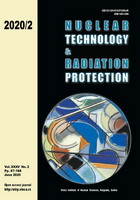
THE EFFECT OF 60Co GAMMA IRRADIATION ON COAL FLY-ASH GEOPOLYMER PASTE SETTING TIME
Pages: 150-153
Authors: Luka Z. Rubinjoni, Srboljub J. Stanković, and Boris B. LončarAbstract
Cementation is the baseline technology for conditioning of low to intermediate level radioactive waste. Geopolymers, a class of alkali activated binders, are a promising new material for radioactive waste treatment. Coal fly-ash based geopolymers are a low-cost, low greenhouse gas footprint alternative to metakaolin based materials. Both the grouting of sludge/powders/liquids and encapsulation of solids/compacted waste rely on the grout maintaining optimal flow (rheological properties) during the mixing and pouring operations, and achieving a set leading to proper long term solidification (mechanical properties). The initial and final setting time for fly-ash geopolymer paste, based on the SRPS EN 196-3 standard, has been measured upon irradiation by gamma rays in a 60Co reference field positioned with a kerma air rate of 3.42 mGys-1. The binder paste was prepared using fly-ash from the TENT B power plant's electrostatic filters without further sieving, activated by water glass with module 1.5 and mixed with distilled water until a satisfactory flow was obtained, and poured into the sample and control molds. The initial and final setting times for the irradiated sample and non-irradiated control were determined by the Vicat apparatus. The irradiated sample demonstrated an 11 % shorter initial setting time, and 16 % shorter final setting time, compared to the control.
Key words: geopolymer, setting time, gamma irradiation, alkali-activated binder
FULL PAPER IN PDF FORMAT (262 KB)
